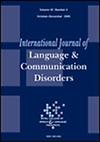Influence of Speech and Language Therapy on Quality of Life in People With Primary Progressive Aphasia: A Scoping Review
Abstract
Background
There is evidence that interventions provided by a speech and language therapist (SLT) can positively impact the quality of life (QoL) of people with primary progressive aphasia (PPA). Current reviews refer to functional approaches rather than categorising QoL-enhancing therapies.
Aims
This paper aims to provide an overview of the approaches provided by SLTs to enhance QoL in people with PPA, taking into account influencing factors and various measurement instruments.
Methods
Given the lack of concepts and inconsistent measurement instruments in the area of QoL-enhancing therapies, the methodology of a scoping review was selected. Studies were identified through a broad database search in five databases (Medline, ScienceDirect, Speechbite, Psyndex and Cochrane). The research was further conducted using Google Scholar and handsearching of reference lists. The 244 studies identified were subjected to a duplicate check as well as a title, abstract and full-text screening. The inclusion criteria were the presence of at least one person with PPA in the study sample, the described implementation of an intervention by at least one SLT, and QoL as a defined and measured outcome criterion. The Mixed Methods Appraisal Tool (MMAT) was used to assess the quality of the studies.
Main Contribution
Twelve studies met the inclusion criteria. The studies showed evidence of an improved or stable QoL of the participants over the period of the respective interventions. Of the included studies, seven interventions took place in individual settings, three in group settings, and one in a dyadic constellation. In one study a combination of individual and group settings was used. The therapeutic approaches mainly aimed at more than one level of the Framework for Outcome Measurement. Most frequently covered were activities and participation (n = 9) and body function and body structure level (n = 7). The assessments used varied widely. The American Speech-Language-Hearing Association Quality of Communication Life Scale was used most frequently (n = 3). Other assessments included the Aphasia Impact Questionnaire-21 or the Stroke and Aphasia Quality of Life Scale-39, as well as interviews or self-administered rating scales. The quality of the studies was heterogeneous and ranged from 2 to 5 out of a maximum of 5 according to MMAT criteria.
Conclusions
The included studies demonstrate the potential of speech and language therapy to improve QoL in people with PPA and provide insights into influencing factors (e.g., treatment dose or setting of therapy). There is a need for high-quality controlled trials of QoL-enhancing interventions and for standardised QoL assessments tailored to the needs of people with PPA.
WHAT THIS PAPER ADDS
- We know that speech and language therapy is valued by people with primary progressive aphasia (PPA) and has potential effects on their quality of life (QoL).
- This scoping review provides an overview of the approaches provided by speech and language therapists, considering influencing factors and measurement instruments.
- Our research indicates a need for high-quality controlled trials of QoL-enhancing interventions. Focusing more on QoL could lead to the person-centred approach that experts are already calling for.


 求助内容:
求助内容: 应助结果提醒方式:
应助结果提醒方式:


